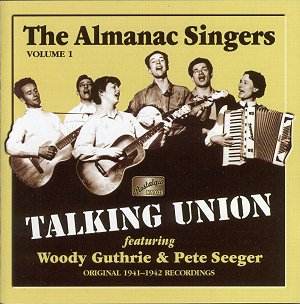 CD Reviews
CD Reviews MusicWeb
Webmaster: Len Mullenger
Len@musicweb.uk.net
[Jazz index][Purchase CDs][ Film MusicWeb][Classical MusicWeb][Gerard Hoffnung][MusicWeb Site Map]

THE ALMANAC SINGERS
VOL. 1
TALKING UNION
Featuring Woody Guthrie and Pete Seeger
Original 1941 - 1943 Recordings
![]() Naxos Nostalgia 8.120567
Naxos Nostalgia 8.120567
Tracks 1 - 7 issued as " Songs For John Doe", Almanac Records Album 102:
Pete Seeger - vocal, banjo; Lee Hays - vocal; Millard Lampell - vocal; Josh White - vocal, guitar; Sam Gary - vocal.
Tracks 8 - 13 issued as " Talking Union " , Keynote Album K-106:
Pete Seeger - vocal, banjo; Lee Hayes - vocal Millard Lampell - vocal; Josh White - vocal, guitar; Sam Gary, Carol White, Bess Lomax Hawes, vocal.
Tracks 14 - 15, issued as single record Keynote 304:
Pete Seeger - vocal, banjo; Lee Hays - vocal; Millard Lampell - vocal; Woody Guthrie - guitar, vocal, harmonica.
Tracks 16 - 21 issued as " Dear Mr. President", Keynote Album K - 111:
Pete Seeger - vocal, banjo; Millard Lampell - vocal; Arthur Stern - vocal; Agnes "Sis" Cunningham - accordion, vocal; Bess Lomax Hawes - vocal, mandolin; Baldwin "Butch" Hawes - vocal, guitar.1. The Strange Death Of John Doe
2. Plow Under
3. Ballad of October 16th
4. Liza Jane
5. Billy Boy
6. "C" for Conscription
7. Washington Breakdown
8. Talking Union
9. Union Train
10. Which Side Are You On ?
11. Get Thee Behind Me, Satan
12. Union Maid
13. All I Want
14. Song for Bridges
15. Babe O' Mine
16. Dear Mr. President
17. Belt-Line Girl
18. Round and Round Hitler's Grave
19. Side by Side
20. Deliver The Goods
21. The Sinking of the Reuben James
"The modern era of folk music in America began with the meeting in New York of Leadbelly's country folk-blues, the itinerant dust-bowl troubadour Woody Guthrie and the incipient urban folk of Pete Seeger."
- Donald Clarke, The Rise And Fall Of Popular Music ( as quoted on the liner of this issue )
The Almanac Singers were originally formed in New York in 1940 and were comprised of Pete Seeger, playwright Lee Hays and actor Millard Lampell. They occupied the ground of liberal left anti Fascists and were concerned with the rights of workers. Initially they arranged their own versions of American folk-tunes such as "Billy Boy " and "Liza Jane"
They are joined on some of these selections by the blues singer/guitarist Josh White and on two tracks by the legendary Woody Guthrie ( who is probably now best remembered by the non-specialist listener as the oft referred to early influence of Bob Dylan ). This music is in many ways the birth of the modern protest song . Some of the earlier selections on this disc are plainly anti war, but apparently this stance changed when Hitler invaded Russia and the group effectively ceased to exist when many of the members enlisted in the US Armed Forces.
Musically the group do not live up to their social significance . The vocals, other than those of Josh White, are at best adequate and the lyrics, to present day ears, sound somewhat naive and a little obvious in their content. The harmonies are of the type heard in folk clubs, normally performed with one finger in the ear. Instrumentally the group are, generally speaking, competent but nothing more . There is the odd moment of greater interest - the banjo playing on "Washington Breakdown " is quite exciting in a Hillbilly style, but these instances are few and far between.
This disc is certainly for the follower of the protest movement in terms of its historical position and would probably appeal to fans of early country music and folk . However, it is not of sufficient merit to grab the casual listener - in fact some of the content is quite banal.
Dick Stafford